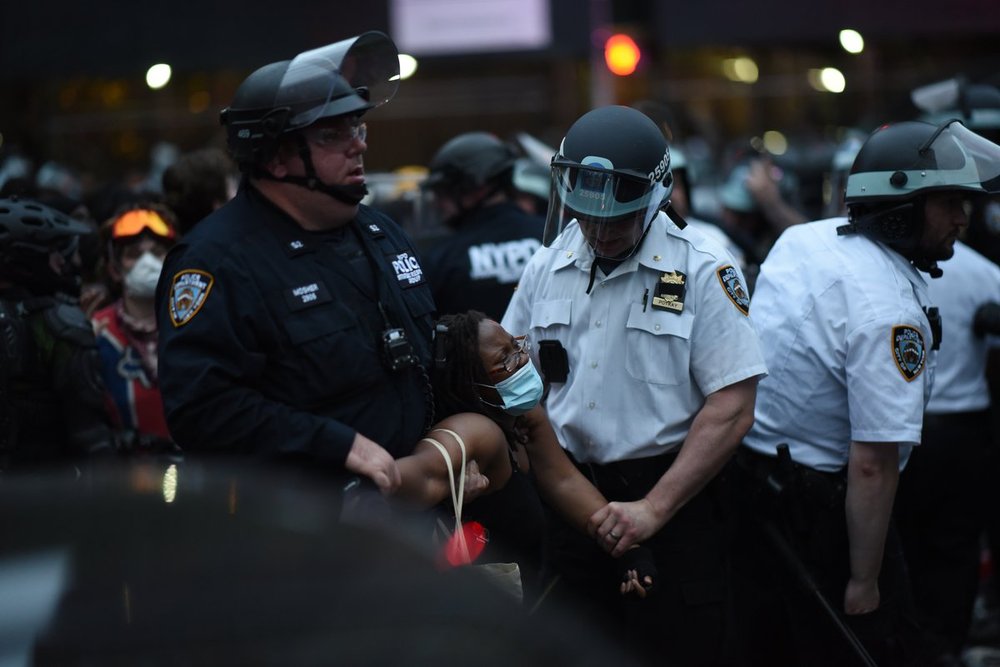Plan to overhaul NYPD protest response survives police union challenge
Feb. 7, 2024, 4:17 p.m.
Police will no longer be allowed to use a controversial tactic called "kettling," where officers encircle protesters before making a mass arrest.

A court-ordered plan to overhaul how the NYPD responds to protests survived a challenge from the city’s largest police union and will be implemented in the coming months, a federal judge ruled on Wednesday.
That means police will no longer be allowed to use a controversial tactic called “kettling,” where officers encircle protesters before making a mass arrest. The department will also be required to form an oversight committee to evaluate how officers act at demonstrations.
The settlement aims to protect New Yorkers’ First Amendment rights to peacefully protest and ensure that officers respond to demonstrations responsibly. It comes in response to lawsuits filed against the NYPD in the wake of citywide protests following the police killing of George Floyd in Minneapolis in 2020. State Attorney General Letitia James, the Legal Aid Society, the New York Civil Liberties Union and private attorneys accused the police department of wrongfully arresting people and using excessive force against nonviolent protesters.
A judge initially signed off on the deal in September. But the Police Benevolent Association, which represents rank-and-file officers, later asked the court to throw out the settlement, arguing it could endanger police. In response, Judge Colleen McMahon ruled on Wednesday that the PBA could not derail a deal that was already agreed upon by all the other parties, including the police department.
Attorneys with the Legal Aid Society, which helped to negotiate the settlement, celebrated the judge’s decision and dismissed the police union’s last-minute objection as a “baseless Hail Mary” meant to stop systemic change.
“We know the NYPD cannot police itself, and we won’t let the PBA destroy a commonsense settlement to address the violence and reckless over-policing New Yorkers experienced firsthand when standing up for Black lives in the summer of 2020,” Deputy Legal Director Molly Biklen and Staff Attorney Jennvine Wong said in a statement. “We look forward to seeing these reforms unfold and will hold both the city and the NYPD accountable if its officers fail to implement these new and needed practices.”
- heading
- Other terms of the proposed settlement include:
- image
- image
- None
- caption
- body
- A new system that will standardize how officers are deployed to demonstrations and require them to use de-escalation tactics before deciding whether to send more officers to the scene
- New limits on the department’s Strategic Response Group, a special NYPD unit that responds to protests and has faced scrutiny for its handling of peaceful demonstrations
- Changes to the department’s disciplinary matrix, which provides guidelines for punishment when officers violate NYPD policy
- A new position in the NYPD that would oversee the department’s response to protests
- Allocations of $1.625 million to the city’s Department of Investigation, which examines the NYPD, $1.45 million to the plaintiffs so they can help to establish the oversight committee
- Policies to bar officers from preventing members of the media from observing or recording in public areas
James said the changes will better protect New Yorkers’ safety and constitutional rights.
“With these policing reforms, New Yorkers can exercise their First Amendment right to peacefully protest without fear, intimidation or harm,” she said in a press release.
PBA President Patrick Hendry said in a statement that he would blame everyone who signed onto the settlement if future protests devolve into chaos.
“The next time a peaceful protest is hijacked by rioters, the next time our roads, bridges or subways are shut down by agitators, New Yorkers should remember that their city chose to encourage these disruptions by signing onto this misguided settlement,” he said.
The NYPD did not immediately respond to a request for comment.
Hundreds of people who attended Black Lives Matter protests in 2020 filed lawsuits and civilian complaints against the NYPD. Their complaints included graphic details of alleged police violence, including bone-breaking baton strikes and zip ties pulled so tightly around demonstrators’ hands that they went numb.
Several class-action lawsuits have led to large payouts from the city, including one agreement to pay $21,500 apiece to hundreds of people who were “kettled” at a Mott Haven protest and $10,000 apiece to more than 1,000 people who were arrested at demonstrations in Manhattan and Brooklyn.
Police union argues against settlement that would change how NYPD responds to protests